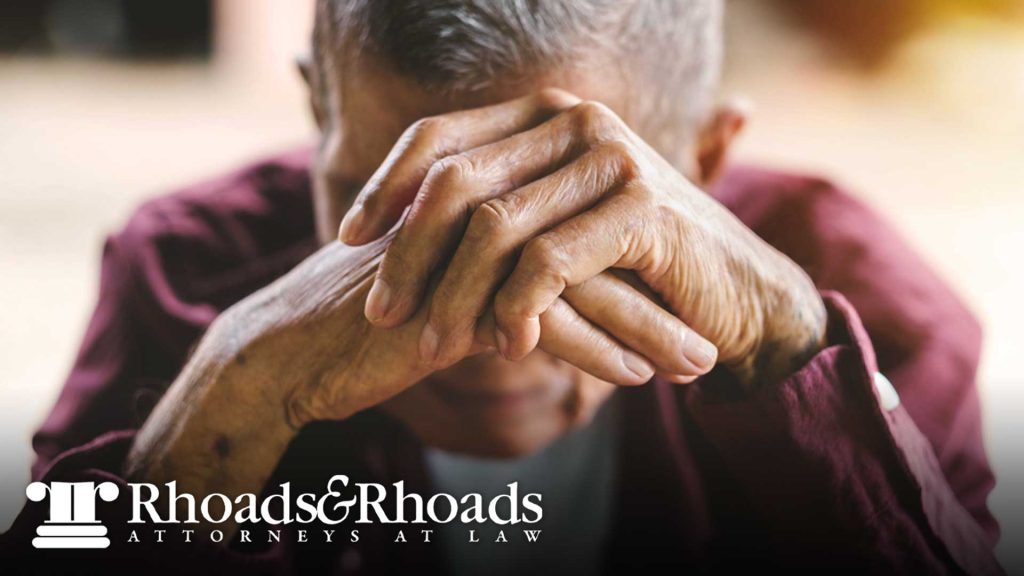The decision to place a family member into an assisted living facility or skilled nursing facility is a difficult one. We all want our family member to be taken care of in a way that provides for their physical and emotional needs and allows them to continue their journeys through life with dignity.
Unfortunately, estimates show there are more than two million cases of senior citizen abuse each year in the United States, many occurring inside nursing homes.
According to the World Health Organization (WHO), elder abuse is a global problem affecting millions of older adults worldwide. The WHO estimates that 1 in 6 people aged 60 years and older experienced some form of abuse in community settings during the past year.
Nursing Home Abuse & Neglect Settlements
$42 Million: Verdict for the death of an elderly nursing home resident due to the abuse and neglect by their nursing facility (Referring Counsel).
$800,000.00: Recovery for the death of a nursing home resident resulting from a fall from their wheelchair.
$650,000.00: Recovery for the death of a nursing home resident resulting from bed sores and mistreatment.
$400,000.00: Recovery for a nursing home resident involving nursing home neglect/abuse.
Why You Need a Nursing Home Abuse Lawyer
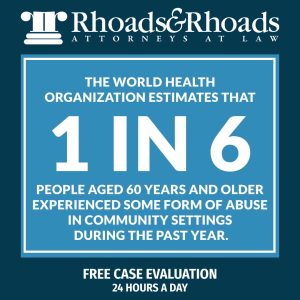 Administrators and staff members must provide appropriate care to their patients. If your loved one has suffered health consequences or has been injured as a result of nursing home abuse, our nursing home abuse attorneys are here to help.
Administrators and staff members must provide appropriate care to their patients. If your loved one has suffered health consequences or has been injured as a result of nursing home abuse, our nursing home abuse attorneys are here to help.
Nursing home lawyers specialize in laws and regulations related to elder care and nursing home facilities. We understand the legal standards and can identify violations more effectively. An experienced attorney is able to advocate on behalf of the victim, ensuring their rights are protected.
Victims of nursing home abuse may be entitled to compensation for medical expenses, pain and suffering, emotional distress, and more. A skilled lawyer can help maximize the compensation received.
The Rhoads & Rhoads legal team and each nursing home abuse lawyer have protected the rights of the injured throughout Western Kentucky for 50 years.
Call 888-709-9329 today for a free case review with one of our nursing home abuse lawyers.
Possible Compensation for a Nursing Home Abuse Lawsuit
Nursing home abuse lawyers help abuse victims claim various types of financial compensation, including:
Economic damages include medical bills, such as costs for hospitalization, surgeries, medications, and rehabilitation. Your elder abuse attorney can help you claim the cost of moving the victim to another facility.
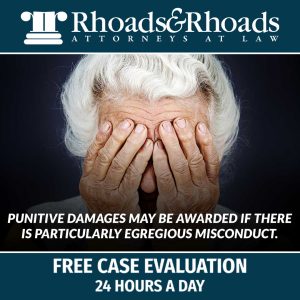 Non-economic damages address the pain and suffering endured by the victim, including emotional distress, loss of enjoyment of life, and mental anguish. Also, a spouse may pursue a claim for loss of consortium, including loss of companionship, society and aid of their spouse who is the victim. These can be complicated to calculate, but your nursing home abuse lawyer can help.
Non-economic damages address the pain and suffering endured by the victim, including emotional distress, loss of enjoyment of life, and mental anguish. Also, a spouse may pursue a claim for loss of consortium, including loss of companionship, society and aid of their spouse who is the victim. These can be complicated to calculate, but your nursing home abuse lawyer can help.
In nursing home abuse cases where the abuse results in death, a loved one may pursue wrongful death claims, seeking compensation for funeral expenses, loss of companionship, and loss of financial support. A nursing home abuse lawyer will fight for compensation while you focus on grieving.
Additionally, punitive damages may be awarded if there is particularly egregious misconduct. Punitive damages are rare, but if your nursing home abuse lawyer can prove they are warranted, they can be significant.
Call Rhoads & Rhoads at 888-709-9329 to discuss possible compensation with a wrongful death and nursing home abuse attorney.
What Is Nursing Home Abuse?
Nursing home abuse refers to the mistreatment or neglect of elderly residents in long-term care facilities. Your nursing home abuse lawyer can provide a detailed explanation of your case but below are examples of the most common nursing home abuse.
Types of Nursing Home Neglect and Abuse
Physical Abuse
Physical abuse is the use of unneeded force resulting in injury, pain, or impairment, such as hitting or inappropriate restraint.
Examples of abuse your nursing home abuse lawyer may try to prove include:
- Hitting, slapping, or pushing: Use of force that causes injury or pain.
- Use of excessive physical restraint: Unnecessary or overly forceful restraint methods.
- Overmedication or inappropriate use of medications: Administering drugs improperly or excessively.
- Force-feeding or withholding food and water: Compelling or denying basic nutritional needs.
Emotional, Psychological, and Mental Abuse
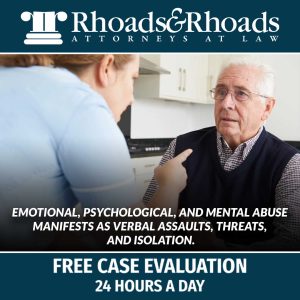 This type of abuse manifests as verbal assaults, threats, and isolation. Your nursing home abuse attorney can help you document your loved one’s mental anguish and pursue compensation.
This type of abuse manifests as verbal assaults, threats, and isolation. Your nursing home abuse attorney can help you document your loved one’s mental anguish and pursue compensation.
Examples of emotional abuse in nursing home abuse cases include:
- Verbal assaults, insults, or threats
- Humiliation or ridicule
- Intimidation or coercion
- Restricting access to personal information or belongings
- Denying the right to make decisions about personal care
- Withholding mail or communication from family and friends
- Limiting participation in activities or community interactions
Sexual Abuse
This type of abuse encompasses any non-consensual sexual contact, regardless of the type of contact.
Examples of sex-related abuse in a nursing home or assisted living facility include:
- Unwanted touching or sexual advances
- Forced nudity
- Sexual assault or rape
- Taking sexually explicit photographs
Financial Exploitation
Financial exploitation involves the unauthorized use of a nursing home resident’s funds or property. Nursing home abuse lawyers can help you collect proof of financial manipulation.
Examples of financial nursing home abuse your nursing home abuse lawyer may prove include:
- Theft of money or personal belongings
- Unauthorized use of bank accounts or credit cards
- Fraudulent changes to wills or financial documents
- Coercing the resident to sign financial documents
We fight for you, not just in court, but in every interaction, championing your rights against large companies when you file a nursing home lawsuit with a nursing home abuse attorney.
Neglect
Neglect, perhaps the most pervasive form of abuse, occurs when caregivers fail to provide essential care, leading to malnutrition, poor hygiene, and untreated medical conditions.
Examples of assisted living facilities and nursing home neglect include:
- Failure to provide adequate food and hydration
- Ignoring medical needs or not administering medications
- Poor hygiene and sanitary conditions
- Failure to assist with personal care needs
- Allowing potential bedsores or pressure sores to unnecessarily develop.
Abandonment
Like neglect, abandonment leaves vulnerable nursing home residents without the protection and care they deserve.
Examples of abandonment of nursing home residents include:
- Deserting the resident in a public place
- Leaving the resident without proper care or supervision
- Ignoring calls for help or distress signals
We’re here to ease your burden. Each experienced nursing home lawyer guides you with care and competence through each step of your legal journey.
Signs of Nursing Home Abuse or Neglect
A critical piece of protecting your loved one from nursing home abuse and neglect is to learn the different kinds of abuse and the signals that can indicate something is wrong.
Signs of Being Abused Physically in a Nursing Home Facility
Individuals who are being physically abused often show more obvious warning signs than nursing home abuse victims of other kinds of abuse. There may be broken bones, bruises, cuts, or other signs of physical injury to any part of the body. Damaged or bloody clothing can be a serious indicator of physical nursing home abuse victims.
Call Rhoads & Rhoads Personal Injury Lawyer at 888-709-9329 for a free consultation with a nursing home neglect attorney.
Signs of Sexual Abuse in Nursing Homes
If a senior citizen is being sexually abused, there may be bruising or injury to genitalia or breasts. Speak with a nursing home abuse attorney immediately if your loved one is diagnosed with a sexually transmitted infection.
Signs of Emotional or Psychological Abuse in a Nursing Home Facility
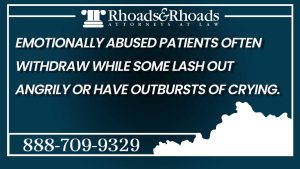 Emotional abuse can include intimidation, isolation, humiliation, and neglect of the patient.
Emotional abuse can include intimidation, isolation, humiliation, and neglect of the patient.
When this type of abuse occurs, you may observe significant and sudden changes in mood and confidence. Emotionally abused patients often withdraw while some lash out angrily or have outbursts of crying.
Signs of Neglect
Neglect can include not providing proper or adequate medical/nursing care, allowing bedsores or pressure sores to develop, leaving patients in soiled clothing or forcing them to live under unsanitary conditions. If you notice your loved one’s appearance or temperament changing drastically, it may be a sign of malnourishment or improper medical treatment.
Your nursing home abuse lawyer can help you document signs of neglect to prove legal action is warranted.
Call the Rhoads & Rhoads legal team at 888-709-9329 to speak with our elder abuse lawyers and find out if you can file a nursing home abuse lawsuit.
Signs of Financial Abuse or Exploitation in Nursing Homes and Assisted Living Facilities
Financial exploitation or abuse occurs when money, belongings, or even the patient’s identity, is stolen, misused, or misrepresented by another. Signs include unpaid bills, unexpected withdrawals or invoices, and missing cash.
It is hard to imagine nursing home administrators or nursing home staff members abusing our elderly loved ones, but it can happen, and some serious injuries lead to wrongful death.
If your loved one is showing signs of nursing home neglect, abuse, or exploitation, call our nursing home abuse lawyers today at 888-709-9329 to discuss legal action.
How to Report Nursing Home Abuse in Kentucky
Reporting abuse in Kentucky is a crucial step to protect vulnerable residents. If you suspect abuse, there are several steps you can take to report it effectively.
Your nursing home abuse attorneys will provide case-specific advice, but here are some general steps to take:
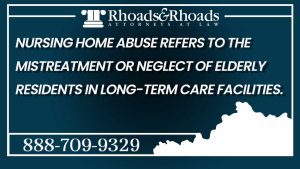 First, it’s important to document any signs or evidence of abuse. Later, your nursing abuse lawyers will ask for photographs of injuries, detailed notes of incidents, and any relevant medical records.
First, it’s important to document any signs or evidence of abuse. Later, your nursing abuse lawyers will ask for photographs of injuries, detailed notes of incidents, and any relevant medical records.
Next, report the abuse to the nursing home administration in writing and provide a copy to your nursing home abuse attorney. The nursing home is legally obligated to investigate and address complaints.
If the administration fails to act or the abuse is severe or ongoing, should contact the proper authorities immediately. The Kentucky Department for Community-Based Services (DCBS) has an Adult Protective Services (APS) division that handles reports of elder abuse. You can reach them by calling their hotline at 1-877-597-2331.
Additionally, it may be appropriate to involve local law enforcement, especially if the abuse is criminal, such as physical abuse, sexual assault, or unwanted sexual contact. Filing a police report can initiate a criminal investigation and provide immediate protection for the nursing home resident.
Lastly, talk to a nursing home attorney who specializes in nursing home abuse cases. Experienced personal injury lawyers who understand nursing home abuse lawsuits (both federal and state laws) will provide essential guidance on how to navigate the legal process.
If you suspect nursing home abuse, call our nursing home abuse lawyers today at 888-709-9329 to discuss your next steps. Each Rhoads & Rhoads nursing home neglect lawyer works on a contingency fee basis, which means our personal injury lawyers and legal team won’t get paid unless we settle or win your case.
Kentucky Elder Abuse Laws
Kentucky has robust elder abuse laws designed to protect senior citizens from mistreatment when a nursing home fails to provide adequate care.
The law also provides for the establishment of Adult Protective Services (APS) within the Department for Community-Based Services.
APS is responsible for investigating reports of abuse, providing protective services, and coordinating with other agencies to ensure the safety and well-being of other residents.
I. Kentucky Revised Statutes (KRS) Chapter 209
KRS Chapter 209 defines abuse, neglect, and exploitation and mandates that anyone who suspects abuse or neglect must report it to the Department for Community-Based Services. Failure to report can result in fines or other penalties. Notify your nursing home lawyer if you believe abuse was not reported in a timeline manner.
II. KRS 209.030 – Reporting and Investigation
KRS 209.030 specifies nursing home abuse reports can be made anonymously and that APS is required to conduct a prompt and thorough investigation to determine the validity of the nursing home abuse claim and assess the need for protective services.
III. KRS 209.990 – Penalties for Elder Abuse and Neglect
KRS 209.990 states causing physical harm, sexual assault, financial exploitation, and neglect can result in criminal charges ranging from misdemeanors to felonies, depending on the severity of the offense.
If you suspect nursing home abuse, call our nursing home abuse lawyers today at 888-709-9329 so we can help you navigate Kentucky’s nursing home abuse lawsuits legal process.
Laws Related to The Rights of a Patient
Patients in nursing homes and other long-term care facilities have specific rights that are protected by both state and federal laws. These rights ensure that residents receive high-quality care, are treated with respect and dignity, and can live free from abuse and neglect.
Kentucky’s Nursing Home Residents’ Bill of Rights
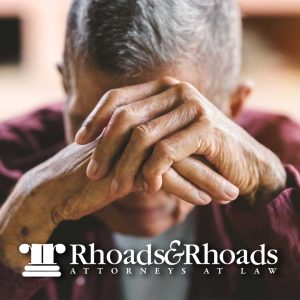 One of the fundamental rights of nursing home residents is the right to be free from abuse, neglect, and exploitation. This includes physical, emotional, sexual, and financial abuse.
One of the fundamental rights of nursing home residents is the right to be free from abuse, neglect, and exploitation. This includes physical, emotional, sexual, and financial abuse.
Residents also have the right to receive adequate and appropriate medical care, which means that caregivers must provide necessary treatments and medications and address the health needs of residents promptly. Your nursing home abuse lawyer can help you determine if medication errors or a faulty procedure also constitute medical malpractice.
Residents have the right to participate in their care planning, including being informed about their medical condition, treatment options, and decision making process. Misleading a patient about their conditions can also be considered medical malpractice. When medical malpractice occurs, your nursing home abuse legal team can explore additional options for compensation.)
Privacy and confidentiality are also critical rights. A nursing home resident has the right to private communication with family and friends, and their information must be kept confidential.
Residents also have the right to a clean and safe living environment. They should not be subjected to isolation, disarray, or being victimized by other residents.
Another important right is the ability to voice grievances without fear of retaliation to state and local regulatory agencies.
Call Rhoads & Rhoads at 888-709-9329 to speak with a nursing home abuse attorney for a free case review and discuss what is considered nursing home abuse.
Who Is Liable in a Nursing Home Negligence Case?
Determining liability for a nursing home abuse case requires your nursing home abuse lawyer to identify the parties responsible for the harm caused to residents.
Typically, your nursing home abuse lawyer can prove one (or more) of these parties are responsible for the nursing home abuse or nursing home neglect:
- First, a nursing home employee who provides care, such as nurses and aides, who perpetrate abuse or neglect can be held liable for their actions.
- Second, the management and administrative staff can be liable if they fail to adequately screen, train, and supervise the nursing home employees, or if they ignore complaints and warning signs of abuse.
- Additionally, the nursing home itself can be held responsible if it fails to implement policies and procedures to prevent nursing home abuse and promptly remedy health and safety hazards.
- Sometimes a nursing home abuse lawyer can prove third-party contractors who provide services are liable because they contributed to the abuse and neglect of your family member.
Call Rhoads & Rhoads at 888-709-9329 to discuss your nursing home negligence case and the possibility of legal action with a nursing home lawyer.

Contact Rhoads & Rhoads Nursing Home Abuse Lawyers
 Nursing home abuse law is complicated. We have experienced nursing home lawyers standing by to help you seek fair financial compensation for a loved one’s serious injuries.
Nursing home abuse law is complicated. We have experienced nursing home lawyers standing by to help you seek fair financial compensation for a loved one’s serious injuries.
Rhoads & Rhoads nursing home neglect attorneys work on a contingency fee basis, which means our legal teams don’t get paid unless we settle or win your case.
Our nursing home abuse attorneys are standing by to answer your nursing home abuse FAQs and protect your rights.
Call Rhoads & Rhoads Nursing Home Attorney at 888-709-9329 for a free nursing home abuse case review with an experienced nursing home abuse attorney. Family members should not attempt to navigate complex legal processes on their own.



